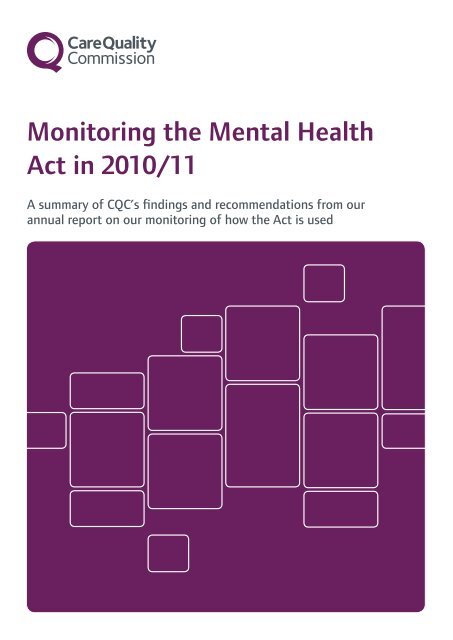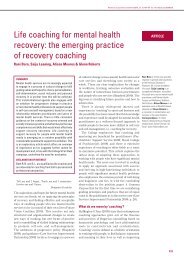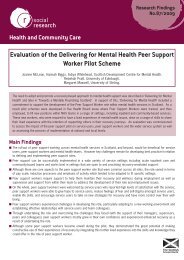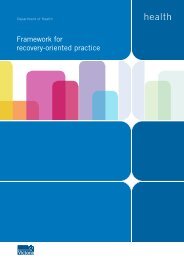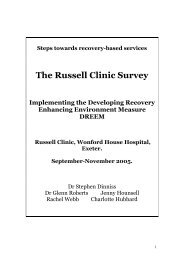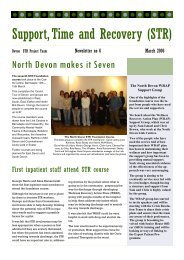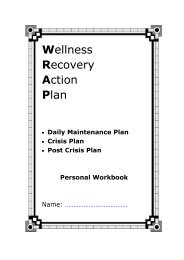Mental Health Act Annual Report 2010/11 - Care Quality Commission
Mental Health Act Annual Report 2010/11 - Care Quality Commission
Mental Health Act Annual Report 2010/11 - Care Quality Commission
Create successful ePaper yourself
Turn your PDF publications into a flip-book with our unique Google optimized e-Paper software.
Monitoring the <strong>Mental</strong> <strong>Health</strong><br />
<strong>Act</strong> in <strong>2010</strong>/<strong>11</strong><br />
A summary of CQC’s findings and recommendations from our<br />
annual report on our monitoring of how the <strong>Act</strong> is used
Contents<br />
About this report.............................................. 3<br />
Foreword............................................................4<br />
Margaret’s story................................................ 6<br />
Monitoring the <strong>Mental</strong> <strong>Health</strong> <strong>Act</strong> in <strong>2010</strong>/<strong>11</strong>... 8<br />
Key findings.......................................................... 10
About this report<br />
The <strong>Mental</strong> <strong>Health</strong> <strong>Act</strong> requires CQC to<br />
report annually to Parliament on our work in<br />
monitoring the use of the <strong>Act</strong> in England. This<br />
publication is an overview of our findings and<br />
recommendations in our full report on the use of<br />
the <strong>Act</strong> from 1 April <strong>2010</strong> to 31 March 20<strong>11</strong>.<br />
It has key implications for professional staff<br />
advising and operating the <strong>Act</strong>, including<br />
<strong>Mental</strong> <strong>Health</strong> <strong>Act</strong> administrators, boards and<br />
senior managers of mental health providers,<br />
and commissioning bodies. It is also relevant to<br />
representative groups of patients and carers.<br />
It is based on our findings from the visits that<br />
our MHA <strong>Commission</strong>ers have made to services<br />
and patients, as well as the work of our Second<br />
Opinion Appointed Doctors. The aim of the<br />
MHA <strong>Commission</strong>er visits is to identify where<br />
the <strong>Act</strong> is not being used correctly. As a result,<br />
our visits often highlight more problems than<br />
positive practice. The visits are not assessments<br />
of the overall standards of care and treatment<br />
in the hospital. This work is carried out by our<br />
compliance inspection teams.<br />
Similarly, our annual report highlights more problems<br />
and concerns with the operation of the <strong>Act</strong> than<br />
examples of good practice. It is not intended to<br />
give a rounded picture of mental health services<br />
for patients subject to the <strong>Act</strong>. We focus on what<br />
we think are the key issues in relation to the <strong>Act</strong><br />
that providers and practitioners should be aware<br />
of and act on where necessary.<br />
<strong>Care</strong> <strong>Quality</strong> <strong>Commission</strong> – Monitoring the <strong>Mental</strong> <strong>Health</strong> <strong>Act</strong> in <strong>2010</strong>/<strong>11</strong> Summary 3
Foreword<br />
I am pleased to<br />
present our second<br />
annual report to<br />
Parliament on<br />
our monitoring of<br />
how the <strong>Mental</strong><br />
<strong>Health</strong> <strong>Act</strong> is<br />
used in England.<br />
It is based on the findings of our<br />
MHA <strong>Commission</strong>ers and Second<br />
Opinion Appointed Doctors when<br />
meeting with patients whose rights<br />
are restricted under the <strong>Act</strong> during<br />
<strong>2010</strong>/<strong>11</strong>.<br />
Our role in monitoring the use of the <strong>Mental</strong><br />
<strong>Health</strong> <strong>Act</strong> is to focus on the concerns of<br />
individual patients and to safeguard their rights.<br />
And the number of people subject to the <strong>Act</strong><br />
rose once again: 5% higher than the year before.<br />
Almost all of this is due to the use of community<br />
treatment orders (CTOs). These are still relatively<br />
new – introduced in November 2008, CTOs<br />
enable patients who are detained in hospital to<br />
be discharged into the community and receive<br />
their treatment there. The number of people<br />
subject to a CTO at the end of the year grew by<br />
nearly 30%, even though fewer new CTOs were<br />
started this year. This suggests that CTO powers,<br />
once implemented, may last for quite some time,<br />
and that the population subject to CTO will<br />
continue to grow.<br />
In last year’s report, we highlighted three priority<br />
areas where services needed to do much better:<br />
involving patients in decisions about their care<br />
and treatment, assessing and recording patients’<br />
consent to treatment, and minimising restrictions<br />
on detained patients. Although we have seen<br />
some examples of good practice this year, we<br />
still see improvements in these areas as the main<br />
priority for providers.<br />
Involving patients is a key factor in promoting<br />
their recovery. We saw some good examples of<br />
patients having significant input into planning<br />
their care, as well as current and ex-patients<br />
being actively involved in how their ward is<br />
run. But equally, concerns about a lack of<br />
patient involvement continued to be one of<br />
the issues most frequently raised by our MHA<br />
<strong>Commission</strong>ers.<br />
Independent advocacy services are an important<br />
safeguard that help and support patients to<br />
understand and exercise their legal rights. We<br />
have some concerns about access to these –<br />
some staff who should have been fulfilling the<br />
detaining authority’s legal duty to explain the<br />
advocacy service to patients did not understand<br />
it, or even know of its existence.<br />
Similarly, we have seen examples of good<br />
practice in relation to consent to treatment, but<br />
there is still significant scope for improvement<br />
in some hospitals. In some cases, we found that<br />
doctors appeared to assume too readily that<br />
patients had the capacity to give their consent.<br />
Detaining authorities must watch out for this,<br />
and make sure that clinicians fully document<br />
their reasoning where a patient’s capacity to<br />
consent may be questioned. Also, the legal<br />
powers of CTO are often misunderstood.<br />
4 <strong>Care</strong> <strong>Quality</strong> <strong>Commission</strong> – Monitoring the <strong>Mental</strong> <strong>Health</strong> <strong>Act</strong> in <strong>2010</strong>/<strong>11</strong> Summary
The third priority area is about minimising<br />
restrictions on patients. This year, we continued<br />
to encounter customs and practices that go<br />
against this principle. Another concern is that<br />
of delays in admissions to hospital due to bed<br />
availability – a long-standing problem that in<br />
some cases places the patient at great risk.<br />
We still found patients being accommodated<br />
in makeshift rooms and temporary beds, and<br />
patients frequently raised with us their anxieties<br />
over the pressure on beds. We also continued to<br />
find patients being detained in hospital longer<br />
than necessary because of a lack of community<br />
or other alternative placements – which raises<br />
a genuine concern that the principle of least<br />
restriction is not fully realised.<br />
Our work to monitor the <strong>Mental</strong> <strong>Health</strong> <strong>Act</strong> helps<br />
to protect the rights of patients. We have a wider<br />
regulatory role – under the <strong>Health</strong> and Social<br />
<strong>Care</strong> <strong>Act</strong> 2008 (HSCA) – to register care providers<br />
and check that they continue to meet essential<br />
standards of quality and safety laid down by law.<br />
If they don’t, we can act quickly and use our<br />
strong enforcement powers if necessary to make<br />
sure they return to compliance.<br />
Increasingly, we are using this wider framework<br />
to strengthen the protection given to people.<br />
Our MHA <strong>Commission</strong>ers and HSCA compliance<br />
inspectors are now working closely together,<br />
sharing overall provider-level findings and<br />
coordinating activity. We have started to see how<br />
concerns about a provider’s use of the <strong>Mental</strong><br />
<strong>Health</strong> <strong>Act</strong> have triggered regulatory action<br />
from us under the HSCA, and we look forward<br />
to being able to report more on this in future<br />
reports. However, the two functions will remain<br />
separate – we are committed to keeping focus<br />
on protecting the rights of people subject to<br />
the <strong>Act</strong>, and using the extensive expertise and<br />
knowledge of our MHA <strong>Commission</strong>ers to help us<br />
do this.<br />
Jo Williams<br />
Chair<br />
Foreword 5
Margaret’s story<br />
We monitor the use of the <strong>Mental</strong> <strong>Health</strong> <strong>Act</strong> above all to make sure that<br />
patients are treated with dignity and their human rights are respected. Talking<br />
to patients and listening to what they tell us is at the heart of what we do.<br />
Margaret, a member of our Service User Reference Panel, offers her view on<br />
what it is like to be subject to compulsion and the impact it has had on her<br />
life.<br />
“It is very hard for me to find anything positive to<br />
say about my experience of being sectioned five<br />
times between 1998 and 2005.<br />
It was not just the fact that the ward I was on<br />
was in a converted nurses’ home and totally<br />
unsuitable for its purpose, offering very little<br />
space for activities and few places to meet<br />
visitors or socialise with other patients. It wasn’t<br />
just that the T-shaped ward made it impossible<br />
for the nurses to keep an eye on everyone to<br />
prevent them from harm.<br />
The very worst was the total reliance on<br />
medicine and the expectation of unquestioning<br />
compliance with this, regardless of the<br />
unpleasant side-effects – accompanied by a<br />
complete lack of curiosity as to why I might be<br />
consistently refusing most of my medicine and<br />
whether there might be things going on in my<br />
life that were triggering my repeated relapses.<br />
This was particularly surprising as I had been well<br />
for 21 years prior to this period.<br />
The only good thing was that, on the whole, the<br />
nurses were kindly and well-intentioned. They<br />
worked hard and did not spend large parts of<br />
their time in the office. But the ward housed 18<br />
older people with hugely diverse problems; some<br />
were bed-ridden and some doubly incontinent,<br />
while the ward only had two bathrooms and<br />
one shower, and the washbasins were virtually<br />
useless for hygiene purposes as the plugs had all<br />
been removed and the water never ran hot. It is<br />
a tribute to their hard work that they managed<br />
to keep us clean and there were no unpleasant<br />
smells. But this meant that they had no time to<br />
talk to people. One-to-ones were unheard of.<br />
Tribunals were also difficult. On one occasion,<br />
the social work report was prepared by someone<br />
who had only met and interviewed me the day<br />
before. His report was full of inaccuracies and it<br />
was hugely distressing that I was not allowed to<br />
challenge it when it was read out, as I had had no<br />
chance to discuss it with my solicitor.<br />
But my story has a very happy ending. If the years<br />
when I was being repeatedly sectioned were the<br />
worst and unhappiest of my life, the six years<br />
since have been about the best. I have a care plan<br />
exactly suited to my needs and a care co-ordinator<br />
who likes and trusts me as I like and trust her.<br />
6 <strong>Care</strong> <strong>Quality</strong> <strong>Commission</strong> – Monitoring the <strong>Mental</strong> <strong>Health</strong> <strong>Act</strong> in <strong>2010</strong>/<strong>11</strong> Summary
I am now a member of CQC’s Service User<br />
Reference Panel, and this has greatly contributed<br />
to my well-being. What could be better for my<br />
mental health than having my opinions listened<br />
to and respected, especially at my advanced<br />
age of 79 I am aware, too, that there have<br />
been great improvements both in the physical<br />
environment and the regime on the ward where<br />
I was detained. One-to-ones are now held on a<br />
regular basis.<br />
I am in hearty agreement both with the <strong>Mental</strong><br />
<strong>Health</strong> <strong>Act</strong> Code of Practice and the NICE<br />
guidelines, particularly where they relate to<br />
patient involvement and especially in the<br />
drawing up of care plans. The Royal College<br />
of Psychiatrists is doing sterling work in its<br />
recommendations on what makes a good ward.<br />
And the CQC now has standards which it can<br />
start to enforce on wards.<br />
The legislators need to think hard about the<br />
wisdom of compulsory ‘treatment’. The human<br />
mind is an immensely complex thing, and there<br />
is absolutely no consensus about the best way<br />
to help us. What works for one, makes another<br />
worse. The lithium that I reluctantly took for a<br />
while was of no discernible benefit to me and<br />
made me feel very physically unwell – yet there<br />
is someone at my bridge club who absolutely<br />
swears by it.<br />
One last word: I shall never think I have any<br />
worthwhile human rights while it is perfectly<br />
legal to deny me access to fresh air for weeks and<br />
even months on end. I do so need a good brisk<br />
walk to burn off all that manic energy! It helps<br />
me get the good night’s sleep I so badly need.”<br />
What could be better for my mental health<br />
than having my opinions listened to and respected,<br />
especially at my advanced age of 79<br />
Margaret<br />
Margaret's story 7
Monitoring the <strong>Mental</strong><br />
<strong>Health</strong> <strong>Act</strong> in <strong>2010</strong>/<strong>11</strong><br />
At any given time, about 16,000<br />
patients are detained in hospital<br />
under the <strong>Mental</strong> <strong>Health</strong> <strong>Act</strong>, and<br />
more than 4,000 people are subject to<br />
community treatment orders (CTOs).<br />
CQC has a statutory duty to monitor<br />
how services exercise their powers<br />
under the <strong>Act</strong>, to provide a safeguard<br />
for patients.<br />
Our MHA <strong>Commission</strong>ers meet patients in private<br />
to discuss their experiences and concerns, to<br />
make sure they understand their rights and check<br />
that staff are using the <strong>Act</strong> correctly. Our MHA<br />
<strong>Commission</strong>ers also talk to staff and review legal<br />
documents and patients’ notes.<br />
We aim to visit every psychiatric ward in England<br />
where patients are detained at least once every<br />
18 months. In <strong>2010</strong>/<strong>11</strong>, we carried out 1,565<br />
visits and met with more than 4,700 patients.<br />
Our main aim is to identify where the <strong>Act</strong> is not<br />
being used correctly and where detained patients<br />
have concerns about their care and treatment.<br />
The visits are not assessments of the overall<br />
standards of care and treatment in the hospital<br />
(that work is carried out by our compliance<br />
inspection teams), but tell the story of the overall<br />
impact on the patient’s experience of detention<br />
and the level of compliance with the <strong>Act</strong> and the<br />
accompanying Code of Practice.<br />
In <strong>2010</strong>/<strong>11</strong>, we carried out<br />
1,565 visits and met with<br />
more than 4,700 patients.<br />
We also safeguard patients’ rights by providing<br />
a statutory second opinion service to certain<br />
patients. The second opinion appointed doctors<br />
(SOADs) decide whether the proposed treatment<br />
is appropriate for the patient and check that<br />
their views and rights have been considered. We<br />
handled more than 13,500 requests for a second<br />
opinion in <strong>2010</strong>/<strong>11</strong>.<br />
Linking to our wider regulatory<br />
and enforcement role<br />
CQC’s broader regulatory<br />
role, under the <strong>Health</strong> and<br />
Social <strong>Care</strong> <strong>Act</strong> 2008, is<br />
to register providers of<br />
health and adult social<br />
care services, and<br />
to check that they<br />
continue to meet<br />
essential standards<br />
of quality and safety<br />
laid down by law.<br />
If they fall below<br />
these standards,<br />
we can take swift action,<br />
using our strong enforcement powers<br />
where necessary, to make sure they return to<br />
compliance.<br />
Most importantly, the essential standards set<br />
out the outcomes and experiences of care that<br />
people should expect, not the processes and<br />
policies that providers should have in place.<br />
When our compliance inspectors check on a<br />
service, they focus on observing the care being<br />
given and talking to patients.<br />
Our MHA <strong>Commission</strong>ers and compliance<br />
inspectors are now working closely together.<br />
8 <strong>Care</strong> <strong>Quality</strong> <strong>Commission</strong> – Monitoring the <strong>Mental</strong> <strong>Health</strong> <strong>Act</strong> in <strong>2010</strong>/<strong>11</strong> Summary
Inspectors take MHA <strong>Commission</strong>ers’ visit<br />
reports into account when assessing a<br />
provider’s compliance, and inspectors and MHA<br />
<strong>Commission</strong>ers will often combine forces by<br />
visiting a service together. In this way, we can use<br />
the wider regulatory framework to strengthen the<br />
protection given to people subject to the <strong>Act</strong>.<br />
Use of the <strong>Mental</strong> <strong>Health</strong> <strong>Act</strong> in<br />
<strong>2010</strong>/<strong>11</strong><br />
In <strong>2010</strong>/<strong>11</strong>, the headline total number of<br />
formal detentions in hospital did not change<br />
significantly from the previous year. There were<br />
45,248 admissions and detentions, compared<br />
with 45,755 in 2009/10. However, this figure<br />
excludes revocations of CTOs, which are not<br />
classed as formal admissions. So some people<br />
who would previously have had repeat formal<br />
admissions may now be being re-detained<br />
in hospital through the revocation of a CTO,<br />
following a recall to hospital.<br />
In <strong>2010</strong>/<strong>11</strong>, there was a total of 3,834 uses of<br />
CTOs across the NHS and independent sector, a<br />
6.6% decrease from 4,103 in 2009/10. However,<br />
many of the CTOs still in place at the end of<br />
<strong>2010</strong>/<strong>11</strong> were made in earlier years – of the<br />
CTOs made since November 2008, only 41% had<br />
ended by 31 March 20<strong>11</strong>.<br />
The overall number of people subject to the <strong>Act</strong><br />
rose by 5%, from 19,947 on 31 March <strong>2010</strong> to<br />
20,938 on 31 March 20<strong>11</strong>. Almost all of this<br />
increase was due to the rise in the number of<br />
people subject to a CTO; this was 4,291, an<br />
increase of 29.1%.<br />
Once again, the use of hospital-based places of<br />
safety increased substantially. The total number<br />
of removals of people by the police to a healthbased<br />
place of safety for assessment under the<br />
<strong>Act</strong> rose by 17.2% compared with the previous<br />
year, from 12,038 to 14,<strong>11</strong>1. As with previous<br />
years, more males than females were made<br />
subject to these orders. However, the number<br />
of these detentions is rising more sharply for<br />
females than for males: between 2009/10 and<br />
<strong>2010</strong>/<strong>11</strong>, there was a 19.2% increase for females<br />
and 15.7% for males.<br />
People from all Black and minority ethnic (BME)<br />
groups can be overrepresented within inpatient<br />
mental health services, and higher rates of<br />
people from BME groups are subject to the <strong>Act</strong>,<br />
particularly from some groups – facts well known<br />
from previous Count me in snapshots. For the<br />
first time, we have summarised an analysis of the<br />
<strong>Mental</strong> <strong>Health</strong> Minimum Data Set information to<br />
give a year-round view of the ethnicity of people<br />
subject to the <strong>Act</strong>.<br />
Recommendations<br />
Providers should ensure that the data they<br />
supply to MHMDS is accurate and complete,<br />
and providers and commissioners need to<br />
make full use of the data set to monitor the<br />
use of the <strong>Mental</strong> <strong>Health</strong> <strong>Act</strong> locally.<br />
The Information Centre for <strong>Health</strong> and Social<br />
<strong>Care</strong> should publish comparative provider<br />
level data on the use of the <strong>Mental</strong> <strong>Health</strong><br />
<strong>Act</strong> to inform local monitoring and service<br />
development.<br />
Overview 9
Key findings<br />
Last year, we highlighted three priority areas<br />
where services needed to do much better:<br />
• z Involving patients in decisions about their care<br />
and treatment.<br />
• z Assessing and recording patients’ consent to<br />
treatment.<br />
• z Minimising restrictions on detained patients<br />
and avoiding ‘blanket’ security measures.<br />
Although we have seen examples of good<br />
practice in some of these areas, improvements by<br />
providers are still the main priority.<br />
Patients’ involvement and<br />
protection of their rights<br />
‘Participation’ is one of the five key underpinning<br />
principles of the MHA Code of Practice – it<br />
emphasises that patients should be involved in<br />
developing and reviewing their own treatment<br />
and care. It is a key factor in promoting recovery.<br />
This year, we saw some good examples of<br />
patients having significant input into planning<br />
their care. But equally, concerns about a lack<br />
of patient involvement continued to be one of<br />
the issues most frequently raised by our MHA<br />
<strong>Commission</strong>ers.<br />
We saw a number of good examples of detaining<br />
authorities helping current and ex-patients get<br />
involved in how the ward is run. And our MHA<br />
<strong>Commission</strong>ers confirmed that patients have<br />
an opportunity to influence this, for example<br />
through community meetings or patient councils,<br />
on 90% of the wards where they checked this.<br />
We looked at access to independent mental<br />
health advocacy (IMHA) services on 3<strong>11</strong> wards<br />
last year and found that almost one in five (18%)<br />
of them did not have access to IMHA services.<br />
This year, we checked this on almost all our visits<br />
and found that detained patients had regular<br />
access to an independent mental health advocate<br />
(IMHA) on 65% of wards we visited. We were<br />
told that IMHAs would come when requested<br />
on 85% of wards. Problems continued with<br />
commissioning arrangements for some IMHA<br />
services, particularly for patients placed out of<br />
the area.<br />
I helped to set up a Patients<br />
Council and became involved in user<br />
empowerment. I believe these steps<br />
forward, which gave a voice to detained<br />
patients, were the best things to happen<br />
in advancing our general treatment. Now<br />
I feel people are interested in my views<br />
and I have input into my care plans and<br />
treatment.<br />
View from a SURP member<br />
A common concern was whether patients and<br />
their ‘Nearest Relative’ were aware of the IMHA<br />
service or how to get in contact with it. We also<br />
found that some staff who should have been<br />
fulfilling the detaining authority’s legal duty to<br />
explain the IMHA service to patients did not<br />
understand it, or even know of its existence.<br />
The First-tier Tribunal (<strong>Mental</strong> <strong>Health</strong>) is the<br />
primary mechanism in England for appeal<br />
against the use of the <strong>Act</strong>’s powers of detention<br />
or supervised community treatment. Hospital<br />
managers have a duty to make sure that their<br />
CTO patients understand their legal position, and<br />
their right to apply to the Tribunal. This includes<br />
giving the information to the patient and, unless<br />
the patient objects, a copy to their Nearest<br />
Relative. However, we found that this legal duty<br />
was often not met.<br />
The number of applications to the Tribunal rose<br />
in the last two years, although this has not<br />
10 <strong>Care</strong> <strong>Quality</strong> <strong>Commission</strong> – Monitoring the <strong>Mental</strong> <strong>Health</strong> <strong>Act</strong> in <strong>2010</strong>/<strong>11</strong> Summary
increased the rate of successful appeals (in terms<br />
of discharge from detention). They accounted for<br />
12% of all outcomes, the same as in 2009.<br />
Appeals against CTOs amounted to 14% of all<br />
hearings in the year. The success rate was only<br />
around 5%, which may be in part because of<br />
the considerable number of ‘automatic’ hearings<br />
generated by the CTO process.<br />
Appeals against CTOs<br />
amounted to 14% of all<br />
hearings in the year.<br />
Recommendation<br />
Providers should make sure that the principle<br />
of patient participation in care planning is<br />
fully embedded in staff training programmes.<br />
Clinical leaders should be helped to create<br />
ward cultures in which patient participation is<br />
the norm.<br />
Consent to treatment<br />
The assessing and recording of capacity and<br />
consent was another of the three issues where<br />
we had identified the need for significant<br />
improvement. Again, we have seen some<br />
examples of good practice, but there is still<br />
significant scope for improvement in some<br />
hospitals.<br />
Although the <strong>Act</strong> allows some medical treatment<br />
for mental disorder to be given without consent,<br />
the patient’s consent should nevertheless be<br />
sought before treatment is given wherever<br />
practicable. This has been another focus of<br />
our visits and we have seen examples of good<br />
practice.<br />
It will not always be necessary to undertake<br />
a full assessment of capacity before treating<br />
somebody, on the basis that they give valid<br />
consent. However, in some cases we found that<br />
doctors appeared to assume too readily that<br />
patients had the capacity to give their consent.<br />
Detaining authorities must watch out for this,<br />
and make sure that clinicians fully document<br />
their reasoning where a patient’s capacity to<br />
consent may be questioned.<br />
The legal powers of CTOs are often<br />
misunderstood, which has implications for<br />
professionals explaining these powers to patients.<br />
For example, some do not know that a CTO<br />
patient has the right to refuse treatment with<br />
medicine while in the community, or that such<br />
refusal is not in itself sufficient cause to recall<br />
the patient to hospital.<br />
In 2008, the safeguard of second opinion<br />
certification was extended to CTO patients who<br />
consent to their treatment. This ‘consenting’<br />
group accounted for two-thirds of CTO second<br />
opinion referrals in <strong>2010</strong>/<strong>11</strong>. These patients<br />
have been hard to engage in the process; some<br />
resent having to have a doctor certify treatment<br />
to which they consent. The <strong>Health</strong> and Social<br />
<strong>Care</strong> Bill currently before Parliament contains a<br />
clause that, subject to the passage of the Bill,<br />
will exempt the treatment of consenting CTO<br />
patients from the need for SOAD certification.<br />
This could help to significantly reduce the<br />
pressure on SOAD services for CTO patients.<br />
Recommendations<br />
Providers should make sure that their<br />
staff take refresher courses on consent to<br />
treatment. Training should be provided in a<br />
range of formats – for example, e-learning<br />
and simulation/role play.<br />
Revalidation and appraisal programmes for<br />
health care professionals should include<br />
assessments of knowledge and skills relating<br />
to capacity and consent.<br />
Providers should ensure that all staff who<br />
care for patients subject to CTOs understand<br />
the scope and limitations of this power.<br />
Any instance of unlawful treatment of a<br />
patient subject to a CTO should be properly<br />
investigated, to help detaining authorities<br />
to learn about the application of the law as<br />
it applies to this group of patients. Patients<br />
should be offered due recourse if necessary.<br />
Key findings <strong>11</strong>
It is best to take part in activities; it<br />
does not reflect favourably if you don’t.<br />
Usually it is the same boring repetitive<br />
stuff: crosswords, word searches, quizzes.<br />
Things that are put on for the sake of it,<br />
rather than owning any value.<br />
View from a SURP member<br />
Patients’ experience of care and<br />
treatment<br />
The third priority area we identified last year<br />
was about minimising restrictions on detained<br />
patients and avoiding blanket restrictions. We<br />
pointed to examples where house rules and<br />
approaches to physical security prevented this.<br />
This year, we continued to encounter customs<br />
and practices that have the same effect.<br />
Although nationally the suggested standard for<br />
bed occupancy is 85%, we still visit some acute<br />
inpatient mental health wards that are running at<br />
full or over capacity, leading to overcrowding and<br />
patients sleeping out. We found patients being<br />
accommodated in makeshift rooms, including<br />
temporary beds placed in general ward areas<br />
or in other rooms that normally serve other<br />
purposes. And patients frequently raised with<br />
us their anxieties over the pressure on beds – in<br />
particular on the chance that they might lose<br />
their bed if they take home leave.<br />
To address the pressures on admission, we<br />
welcome the continued development of recovery<br />
houses (also called crisis houses) – these can<br />
provide care in a less restrictive setting, are<br />
generally popular with service users, and studies<br />
have shown that they are as effective as inpatient<br />
units in clinical terms.<br />
We have particular concerns about ‘lapsing’<br />
recommendations for admission – where a bed<br />
is not found before the 14-day limit on the<br />
application expires. We also continue to find<br />
patients who are detained in hospital longer<br />
than necessary because of a lack of community<br />
or other alternative placements, which raises<br />
a genuine concern that the principle of least<br />
restriction is not fully realised.<br />
Our MHA visits this year have raised some<br />
questions about how inpatient units are being<br />
used for people with a learning disability,<br />
particularly assessment and treatment units.<br />
These units are intended to provide short-term<br />
assessment and treatment services and, where<br />
appropriate, rehabilitation services for people<br />
with a learning disability (often people who are<br />
detained under the <strong>Act</strong>).<br />
According to the Count me in census, people<br />
with a learning disability were more likely to be<br />
in low and medium secure settings and were<br />
in hospital much longer compared with people<br />
with mental health problems. It is important that<br />
commissioners and providers work collaboratively<br />
to make sure that people placed in these services<br />
are being assessed and receiving treatment as<br />
intended, and take appropriate action if this is<br />
not the case.<br />
We still meet with patients who raise issues<br />
about feeling bored or wanting more to do while<br />
they are in hospital – often with a sense that<br />
meaningful activities come some way down the<br />
list of considerations in their treatment or care<br />
plan. This prompted us to take a special look at<br />
this issue in <strong>2010</strong>/<strong>11</strong>.<br />
We found that the vast majority of patients<br />
(90%) said that there were activities available on<br />
the ward, though fewer (78%) reported access to<br />
activities available off the ward. Around a third<br />
of patients who responded said there wasn’t<br />
enough for them to do on weekdays, a figure<br />
that rose to more than half of patients during the<br />
evening and almost two-thirds at weekends.<br />
Overall, we found that a wide range of<br />
therapeutic activities are available on most<br />
wards, and these are advertised reasonably<br />
well and reviewed on a regular basis. However,<br />
the analysis did raise questions about how<br />
well activities are tailored to individual needs<br />
and interests, and how effectively patients are<br />
encouraged and motivated to take part.<br />
12 <strong>Care</strong> <strong>Quality</strong> <strong>Commission</strong> – Monitoring the <strong>Mental</strong> <strong>Health</strong> <strong>Act</strong> in <strong>2010</strong>/<strong>11</strong> Summary
Recommendations<br />
All staff with responsibilities for the<br />
provision of therapeutic activities should<br />
monitor participation in such programmes.<br />
Programmes should be reviewed as necessary<br />
to make sure they are relevant to patients’<br />
needs and interests, and that there is a<br />
positive approach to engaging patients in<br />
them.<br />
<strong>Commission</strong>ers of inpatient mental health<br />
services should make sure that local needs<br />
assessments for mental health services are<br />
robust, and that availability of beds and<br />
evidence-based alternatives to admission<br />
meet the needs of local people, bearing<br />
in mind the Royal College guidance on<br />
occupancy levels in determining the resources<br />
needed.<br />
Where people have been assessed under<br />
the <strong>Act</strong> as needing admission, delays are a<br />
major safety issue. We recommend that NHS<br />
providers report this as a serious untoward<br />
incident (level 4) to NRLS and/or as a<br />
safeguarding issue.<br />
Promoting patient safety<br />
Promoting patient safety is an extremely<br />
important issue for mental inpatient services. It is<br />
reasonable for anyone to expect to be safe when<br />
they go into hospital, and that the treatment<br />
they receive is therapeutic and appropriate to<br />
their needs.<br />
Most people working in mental health are<br />
compassionate and professional, even under the<br />
considerable stresses of their work. But detaining<br />
authorities must always be extremely vigilant<br />
about safeguarding patients from abuse.<br />
We take the view that the wider patient<br />
involvement in care planning can be, the<br />
better the service will be. If there is an ethic<br />
of genuinely helping the patients to have a<br />
say in their treatment, including creating real<br />
opportunities for patients to record their own<br />
views and experiences following, for example,<br />
restraint incidents (through the help of<br />
independent advocacy if appropriate), then there<br />
is a smaller likelihood that abuse can occur.<br />
As with restraint, many services could markedly<br />
improve their seclusion practice through patient<br />
involvement in care planning and post-incident<br />
reviews. In one example, we found significant<br />
use of seclusion as a way of dealing with difficult<br />
behaviour, and there was a danger of it becoming<br />
a cultural expectation on the unit.<br />
During the year, we raised concerns in a number<br />
of hospitals over reductions in staffing, which<br />
can compromise the quality and safety of care.<br />
More generally, though, patients’ concerns<br />
are simply about the lack of continuity of care<br />
because of the reliance on agency or bank staff.<br />
Recommendation<br />
All detaining authorities should give patients<br />
the opportunity to record their experience<br />
and views after restraint incidents, in line<br />
with the Code of Practice guidance, as a part<br />
of wider patient involvement in care planning<br />
and review.<br />
Deaths of detained patients<br />
Detaining authorities must notify CQC of any<br />
death of a patient who is detained under the <strong>Act</strong>.<br />
The main purpose of this is to make sure that<br />
we can take appropriate monitoring action in<br />
response to individual cases.<br />
In the past year, we have been represented<br />
on, and worked alongside, the Independent<br />
Advisory Panel to the Ministerial Board on<br />
Deaths in Custody and its stakeholder groups.<br />
The Ministerial Board was established to consider<br />
how to prevent deaths in all forms of custody,<br />
and we have welcomed our engagement with it.<br />
We were notified of 294 deaths of detained<br />
patients in 2009, and 283 in <strong>2010</strong>. Threequarters<br />
of them were due to natural causes.<br />
About a third of the patients who died of natural<br />
causes while detained in 2009 and <strong>2010</strong> did so<br />
before their 61st birthday. This supports findings<br />
of reduced life expectancy among people with<br />
Key findings 13
long-term serious mental disorder – this has<br />
been attributed to a combination of factors<br />
including multiple social disadvantage, longterm<br />
antipsychotic medicine use and higher-risk<br />
lifestyles, particularly smoking. It also reinforces<br />
concerns that people with serious mental health<br />
problems may have reduced access to physical<br />
healthcare.<br />
Of the <strong>11</strong>5 deaths in 2009 and <strong>2010</strong> that<br />
were due to unnatural causes, most were due<br />
to suicide or self-harm. Overall, 44% of these<br />
unnatural deaths resulted from hanging or selfstrangulation.<br />
The number of self-inflicted deaths of detained<br />
patients has dropped significantly since<br />
the National Patient Safety Agency (NPSA)<br />
highlighted the need to address potential ligature<br />
points created by non-collapsible curtain or<br />
bathroom rails. In <strong>2010</strong> there were 34 selfinflicted<br />
deaths, compared to 51 in 2007. The<br />
NPSA describes suicide using such a ligature<br />
point as an event that need never happen, but<br />
continue to identify potential ligature points in<br />
hospital environments as safety issues.<br />
We recognise that this is a complex area<br />
and that other factors need to be taken into<br />
consideration, including staff observation levels,<br />
the quality of engagement of patients by staff,<br />
engagement with families and carers, practice<br />
in risk assessment, risk management and care<br />
planning, as well as the design of the physical<br />
environment.<br />
Of the <strong>11</strong>5 deaths that were due<br />
to unnatural causes, most were<br />
due to suicide or self-harm.<br />
We have been surprised to find some examples<br />
of risk assessments not being reviewed following<br />
incidents such as absconding, physical violence,<br />
or where a patient expressed suicidal ideas.<br />
And one common failure in risk assessment has<br />
been a lack of support for patients who receive<br />
bad news, whether to do with their personal<br />
life outside hospital or their progress through<br />
the hospital system. It is vital that in these<br />
circumstances patients receive support from staff<br />
and a fresh assessment of risk is undertaken.<br />
14 <strong>Care</strong> <strong>Quality</strong> <strong>Commission</strong> – Monitoring the <strong>Mental</strong> <strong>Health</strong> <strong>Act</strong> in <strong>2010</strong>/<strong>11</strong> Summary
© <strong>Care</strong> <strong>Quality</strong> <strong>Commission</strong> 20<strong>11</strong><br />
Published December 20<strong>11</strong><br />
This publication may be reproduced in whole or in part in any<br />
format or medium for non-commercial purposes, provided<br />
that it is reproduced accurately and not used in a derogatory<br />
manner or in a misleading context. The source should be<br />
acknowledged, by showing the publication title and © <strong>Care</strong><br />
<strong>Quality</strong> <strong>Commission</strong> 20<strong>11</strong>.
How to contact us<br />
Telephone: 03000 616161<br />
Website: www.cqc.org.uk<br />
Email: enquiries@cqc.org.uk<br />
Write to us at:<br />
<strong>Care</strong> <strong>Quality</strong> <strong>Commission</strong><br />
Citygate<br />
Gallowgate<br />
Newcastle upon Tyne<br />
NE1 4PA<br />
Please contact us if you would like<br />
this document in other formats or<br />
languages.


